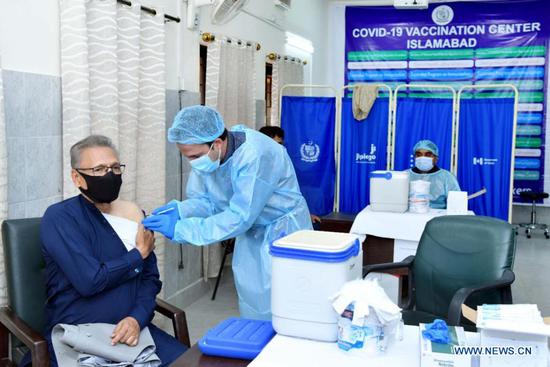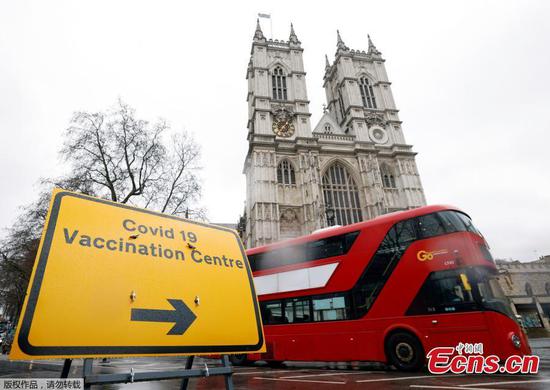Medical experts are concerned that halting the rollout in several European nations of the COVID-19 vaccine developed by AstraZeneca and the University of Oxford might pose a serious health risk and fuel vaccine hesitancy in the general population.
France, Germany, Italy and Spain have joined a number of smaller European countries in temporarily halting the use of the vaccine, following reports that some people have developed blood clots after being inoculated.
Last week, the European Medicines Agency said that 30 cases of blood clotting had been reported as of March 10 among the close to 5 million people treated with the Oxford-AstraZeneca vaccine in the 30-country European Economic Area.
Health authorities of several European nations said they need to establish whether there is a link between the blood clotting and the vaccine before resuming its distribution.
However, the EMA-along with the World Health Organization and the United Kingdom's regulator, the Medicines and Healthcare products Regulatory Agency-have said there is no evidence of a link between the Oxford-AstraZeneca vaccine and the blood clots.
In addition, independent health experts have pointed out that the number of instances of blood clotting among the vaccinated is on a par with or lower than what would be expected in the general population, and that stopping the rollout might lead to an uptick in severe COVID-19 cases that would otherwise be prevented by the vaccine.
"The decisions by France, Germany and other countries look baffling," said Michael Head, a senior research fellow in global health at the University of Southampton in the United Kingdom. "The data we have suggests that numbers of adverse events related to blood clots are the same-and possibly, in fact, lower-in vaccinated groups compared to unvaccinated populations."
German authorities said on Monday that they had identified seven cases of cerebral venous sinus thrombosis, or CVT, a type of blood clotting, among the 1.6 million people in the nation who have received the AstraZeneca vaccine. Three of the cases in Germany proved fatal, and there have been several other fatalities in Italy among people who have been inoculated.
Clemens Wendtner, who heads an infectious diseases unit at the Schwabing Clinic in Munich, said the rate of CVT among the vaccinated is higher than the number of normal, so-called background incidents in the general population, which he put at from two to five per million people per year.
"This should be the reason to suspend the vaccination in Germany until all cases, including suspected cases in Germany and Europe, have been completely cleared up," Wendtner told Reuters.
However, Paul Hunter, a professor of medicine at the University of East Anglia in the UK, said recent research suggests that background levels of CVT are actually higher than those cited by German authorities. He pointed to a 2016 study in the Netherlands that found 13.2 cases of CVT per million per year, and a 2012 Australian study that found 15.7 cases per million per year.
Hunter also drew a comparison between the risk of CVT and the risk of death from COVID-19. He said that the COVID-19 mortality rate among men in their mid-40s, for example, is around 1,000 deaths per million infections-"substantially greater" than the risk posed by CVT.
"Clearly this possible association needs to be thoroughly investigated," Hunter said. "But we do need to consider the real harm from delays in immunization campaigns, at a time when the incidence of COVID-19 is still increasing in several European countries, when deciding whether or not to pause vaccination campaigns."
Ann Taylor, chief medical officer at AstraZeneca, said that rates of blood clotting among the vaccinated are not alarmingly high.
"Around 17 million people in the EU and UK have now received our vaccine, and the number of cases of blood clots reported in this group is lower than the hundreds of cases that would be expected among the general population," she said in a statement on Sunday.
"The nature of the pandemic has led to increased attention in individual cases, and we are going beyond the standard practices for safety monitoring of licensed medicines in reporting vaccine events, to ensure public safety," she added.
Head, the Southampton University research fellow, said that pausing inoculation programs without convincing evidence serves to lower public confidence in vaccinations, which could lead to growing numbers of people declining to be inoculated.
"Halting a vaccine rollout during a pandemic has consequences," Head said. "This results in delays in protecting people, and the potential for increased vaccine hesitancy, as a result of people who have seen the headlines and understandably become concerned. There are no signs yet of any data that really justify these decisions."
Experts estimate that around 80 percent of any population would need to be immune to COVID-19 to reach so-called herd immunity level, which is where those who are not vaccinated receive indirect protection.
Vaccine hesitancy was already comparatively high in some European nations before the pause in distribution of the AstraZeneca vaccine, including in France, where only 59 percent of respondents said they were likely to get vaccinated, according to a March survey by consultancy Kekst CNC.
Peter Openshaw, who is a professor of experimental medicine at Imperial College London, said that the benefits of being vaccinated far outweigh the "possible concern "over a "rather rare type of blood clot".
He told the BBC on Tuesday that suspension of the rollout is "a disaster for the vaccination uptake in Europe, which is already on slightly unsteady ground in some countries."
On Monday, the EMA said it is working with AstraZeneca as well as blood disorder experts to analyze the data related to blood clotting.
The regulator's recommendations were expected to be announced on Thursday.


















































